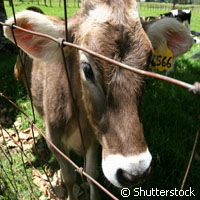Study confirms prions transmissible by air
German and Swiss researchers have discovered that prions, the infectious agents that trigger Creutzfeldt-Jakob disease (CJD) and bovine spongiform encephalopathy (BSE, or 'mad cow' disease), are transmissible by air. Presented in the journal PLoS Pathogens, the findings could lead to the development of new defensive measures to be implemented by scientists and animal experts. The study was funded in part by the EU projects ANTEPRION and PRIORITY projects. Researchers have known for some time that prions are transmissible via contaminated surgical instruments, food, milk, saliva, faeces, urine, and blood transfusions, although the latter is a rare occurrence. However, information about whether prions can be transmitted through the air was lacking. The scientists from the University of Zurich in Switzerland and the Institute of Immunology, Friedrich-Loeffler-Institut, Tübingen in Germany tested immunodeficient and immunocompetent mice to determine whether they were susceptible to airborne prions. They placed the mice in special inhalation chambers and exposed them to prion-containing aerosols, which resulted in disease. They found that just 1 minute of exposure to aerosols was enough to trigger disease in each subject. Furthermore, the longer they were exposed to the aerosols, the faster the first symptoms of disease emerged. Their research proves that prions are airborne. The researchers said prions appeared to transfer from the airways and colonise the brain directly, adding that a number of immune system defects failed to prevent infection. 'A functionally intact immune system is not strictly needed for aerogenic prion infection,' the authors of the study write. The team pointed out that prions are responsible for causing the mad cow disease epidemic that crippled the British beef industry in the early 1990s. More than 280,000 cows have died because of BSE. The transmission of BSE to humans, which can result when a person consumes food derived from BSE-infected cows, triggers human variant Creutzfeldt-Jakob disease (vCJD), which is characterised by a progressive and invariably lethal breakdown of brain cells. Nearly 300 people have died after eating food produced from BSE-infected cows. Researchers say precautionary measures against prion infections in scientific laboratories, abattoirs, and animal feed plants generally do not include strict measures to protect against aerosols. This latest research may compel scientists and the food industry to think about how prions are transmitted through the air, and to develop regulations that could minimise the risk of prion infection in both humans and animals. 'These results suggest that current biosafety guidelines applied in diagnostic and scientific laboratories ought to include prion aerosols as a potential vector for prion infection,' the authors write. . ANTEPRION ('Development of a preclinical blood test for prion diseases') received EUR 2.45 million under the 'Life sciences, genomics and biotechnology for health' Thematic area of the Sixth Framework Programme (FP6), while PRIORITY ('Protecting the food chain from prions: shaping European priorities through basic and applied research') is backed under the 'Food, agriculture and fisheries, and biotechnology' Theme of the Seventh Framework Programme (FP7) to the tune of EUR 6 million.For more information, please visit:University of Zurich:http://www.uzh.ch/index_en.htmlInstitute of Immunology, Friedrich-Loeffler-Institut, Tübingen:http://www.fli.bund.de/en/startseite/research-institutes/institut-fuer-immunologie.htmlPLoS Pathogens:http://www.plospathogens.org/home.actionANTEPRION:http://anteprion.vitamib.com/PRIORITY:http://www.prion-priority.eu/web/index.php
Countries
Switzerland, Germany



